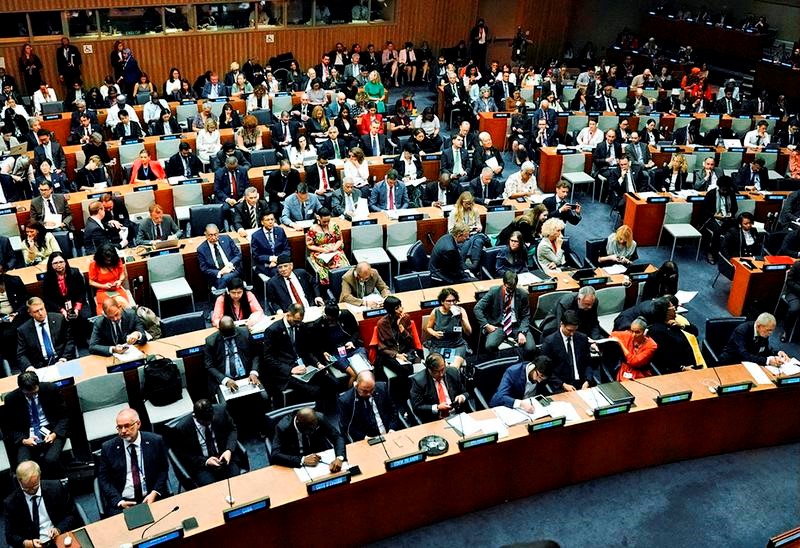Description

Disclaimer: Copyright infringement not intended.
Context
- The absence of China, the United States, and India at the Climate Ambition Summit (CAS) held as part of the United Nations General Assembly is notable due to the significant role these countries play in global greenhouse gas emissions.
Details
- Global Emissions Significance: China, the U.S., and India are among the top three emitters of greenhouse gases globally, collectively responsible for approximately 42% of global emissions. Their actions and commitments are crucial in the efforts to combat climate change.
- Purpose of the Summit: The CAS was organized by the United Nations to showcase leaders who have credible actions, policies, and plans to address climate change and to uphold the goal of limiting global warming to 1.5 degrees Celsius as outlined in the Paris Agreement.
- Limited Participation: Despite the summit's importance, only representatives from 34 states and seven institutions were given speaking slots on the day of the event. Notably, India's neighboring countries like Sri Lanka, Nepal, and Pakistan were included as speakers, along with other emerging economies.
- Criteria for Participation: Countries seeking speaking slots at the summit were expected to present updated pre-2030 Nationally Determined Contributions (NDCs), net-zero targets, energy transition plans, fossil fuel phase-out plans, renewable energy targets, Green Climate Fund pledges, and adaptation and resilience plans. This indicates a high bar for participation.
- Future Commitments: All main emitters, including the G-20 nations, were encouraged to commit to presenting more ambitious economy-wide NDCs with absolute emissions cuts and covering all greenhouse gases by 2025.
- India's Climate Pledges: India updated its climate pledges in 2022, aiming to reduce emissions intensity by 45% from 2005 levels by 2030. The government also committed to sourcing 50% of its electric power from renewable, non-fossil fuel sources and increasing carbon sinks through afforestation.

About the Summit
- The Climate Ambition Summit held at the United Nations Headquarters in New York on 20 September 2023 aimed to address the urgent need for climate action in response to the latest scientific assessment by the Intergovernmental Panel on Climate Change (IPCC).
Urgency of Climate Action
- The IPCC's latest scientific assessment emphasized the pressing need for immediate and substantial reductions in greenhouse gas emissions.
- The climate crisis has already caused extensive damage, and emissions remain at record levels.
- To limit global warming to 1.5°C above pre-industrial levels and prevent the worst impacts, rapid and ambitious action is required.
Climate Justice and Equity
- The summit acknowledged that populations least responsible for the climate crisis are suffering the most from its impacts.
- This issue of climate justice and equity calls for immediate assistance and support from governments and international financial institutions to help vulnerable communities adapt and recover from climate-related loss and damage.
Multisectoral Participation
- The summit aimed to accelerate climate action by bringing together governments, businesses, financial institutions, local authorities, and civil society.
- It recognized the need for collective global will to transition to a renewable-energy-based, climate-resilient global economy.
Three Acceleration Tracks
The summit operated on three interrelated acceleration tracks: Ambition, Credibility, and Implementation.
- Ambition:
- Government leaders, especially major emitters, were expected to present updated pre-2030 Nationally Determined Contributions (NDCs) and net-zero targets.
- They were also encouraged to commit to energy transition plans with no new coal, oil, and gas projects, phase-out plans for fossil fuels, and more ambitious renewable energy targets.
- The Green Climate Fund pledges and economy-wide plans on adaptation and resilience were part of the agenda.
- Importantly, all main emitters and G20 governments were urged to commit to presenting more ambitious economy-wide NDCs with absolute emissions cuts by 2025.
- Credibility:
- Leaders of businesses, cities, regions, and financial institutions were expected to align their transition plans with a UN-backed credibility standard outlined in the "Integrity Matters" report.
- This standard called for net-zero pledges that are fully aligned with the 1.5°C target.
- It included specific requirements such as 2025 and 2030 targets, addressing scope 3 emissions, phasing out fossil fuels, achieving real emissions cuts without offsets, and advocating for science-based climate action.
- Implementation:
- Leaders from various sectors were tasked with presenting existing or emerging implementation partnerships focused on decarbonizing high-emitting sectors like energy, shipping, aviation, steel, and cement.
- Additionally, partnerships addressing climate justice issues, such as reforming the international financial system and improving early warning systems for adaptation and loss and damage, were discussed.
.jpg)
Conclusion
The absence of these major emitters from the summit reflects the complexities and challenges in achieving a coordinated global response to climate change. It underscores the importance of ongoing diplomatic efforts to engage these nations in addressing the climate crisis and aligning their actions with the Paris Agreement's goals.
Climate Ambition Summit was a critical political milestone in demonstrating global commitment to addressing the climate crisis. It aimed to catalyze ambitious action across multiple sectors, promote credibility in climate pledges, and drive the implementation of solutions to decarbonize high-emitting sectors and achieve climate justice.
|
PRACTICE QUESTION
Q. The Climate Ambition Summit (CAS) held during the United Nations General Assembly saw the conspicuous absence of major economies, including China, the United States, and India, despite their significant roles in global greenhouse gas emissions. Analyze the implications of the absence of these countries at the summit in the context of global climate action. (150 Words)
|
https://www.un.org/en/climatechange/climate-ambition-summit















